PLEASE NOTE:
While the following article relates to your Google search, the services and methods at Goodwin Hypnosis may differ from those mentioned below. Since 2007, we have helped thousands of clients to overcome emotional and behavioral challenges when all else had failed. According to many of them (and their referring healthcare providers), our methods are faster than talk therapy, easier than willpower, and safer than medication. If you’re ready to resolve your issues, skip the article and visit the rest of our website, where you can learn about our unique approach, watch client testimonial videos, and discover how working with us one-on-one could be the solution you’ve been searching for.
We can help you with a variety of issues relating to emotional trauma. While we don't diagnose disorders like PTSD, we have helped hundreds of clients to overcome a wide range of traumatic experiences and their negative effects with methods that are more efficient and comfortable than CBT or EMDR. If you would like to learn more about working with us one-on-one to clear your trauma, click here.
Introduction
Navigating the emotional landscape of Post-Traumatic Stress Disorder (PTSD) can be a daunting journey, not just for those directly affected, but also for their loved ones. As individuals grapple with a range of emotional responses—such as anxiety, sadness, and withdrawal—partners often find themselves seeking ways to foster understanding and connection amidst the turmoil. The complexities of PTSD can create barriers to communication and intimacy, making it essential for both partners to cultivate a nurturing environment that encourages open dialogue and mutual support.
Through innovative therapeutic approaches and shared coping strategies, couples can embark on a path toward healing, transforming their relationships into safe havens where both individuals can thrive. This article delves into the emotional impact of PTSD, the challenges it presents in relationships, and the empowering strategies that can help partners support each other through the healing process.
Understanding the Emotional Impact of PTSD on Individuals
Post-Traumatic Stress Disorder triggers a range of psychological responses that can significantly impact both the individual and their loved ones. Statistics indicate that approximately 70% of individuals with post-traumatic stress disorder experience significant emotional distress, with common reactions including:
- Anxiety
- Anger
- Deep sadness
- Intrusive flashbacks
- Hypervigilance
- Distressing nightmares
Emotional numbness may also occur, making daily interactions feel overwhelming. For associates of those grappling with PTSD, understanding these emotions is essential. It fosters a sense of patience and compassion that can significantly strengthen the relationship. For instance, when a partner withdraws during a triggering event, it’s crucial to recognize that this behavior is not a reflection of their love or commitment but rather a coping mechanism. This awareness can alleviate feelings of rejection or frustration, providing a pathway to deeper connection and mutual support.
Personal journeys, like those of Amber and Vanessa, illustrate the power of innovative techniques. Amber found relief from debilitating trauma symptoms through Gina's skillful methods, which included cognitive restructuring and processing, while Vanessa experienced transformation with Todd's effective and compassionate approach, utilizing hypnosis and NLP. Their testimonials highlight that acknowledging emotional responses is vital for healing and understanding.
As emphasized in the case study titled 'Resilience in the Face of Death,' nurses reflected on their ability to relate to the suffering of families and patients, which they believed enhanced their empathy and resilience. This resilience allowed them to appreciate their own lives while maintaining a professional demeanor in challenging situations. One nurse poignantly expressed, 'When a patient passes, I am able to acknowledge their suffering is over.' Such viewpoints can be applied to connections influenced by trauma, where adopting a compassionate approach enables partners to navigate the intricacies of distress together, resulting in transformative healing.
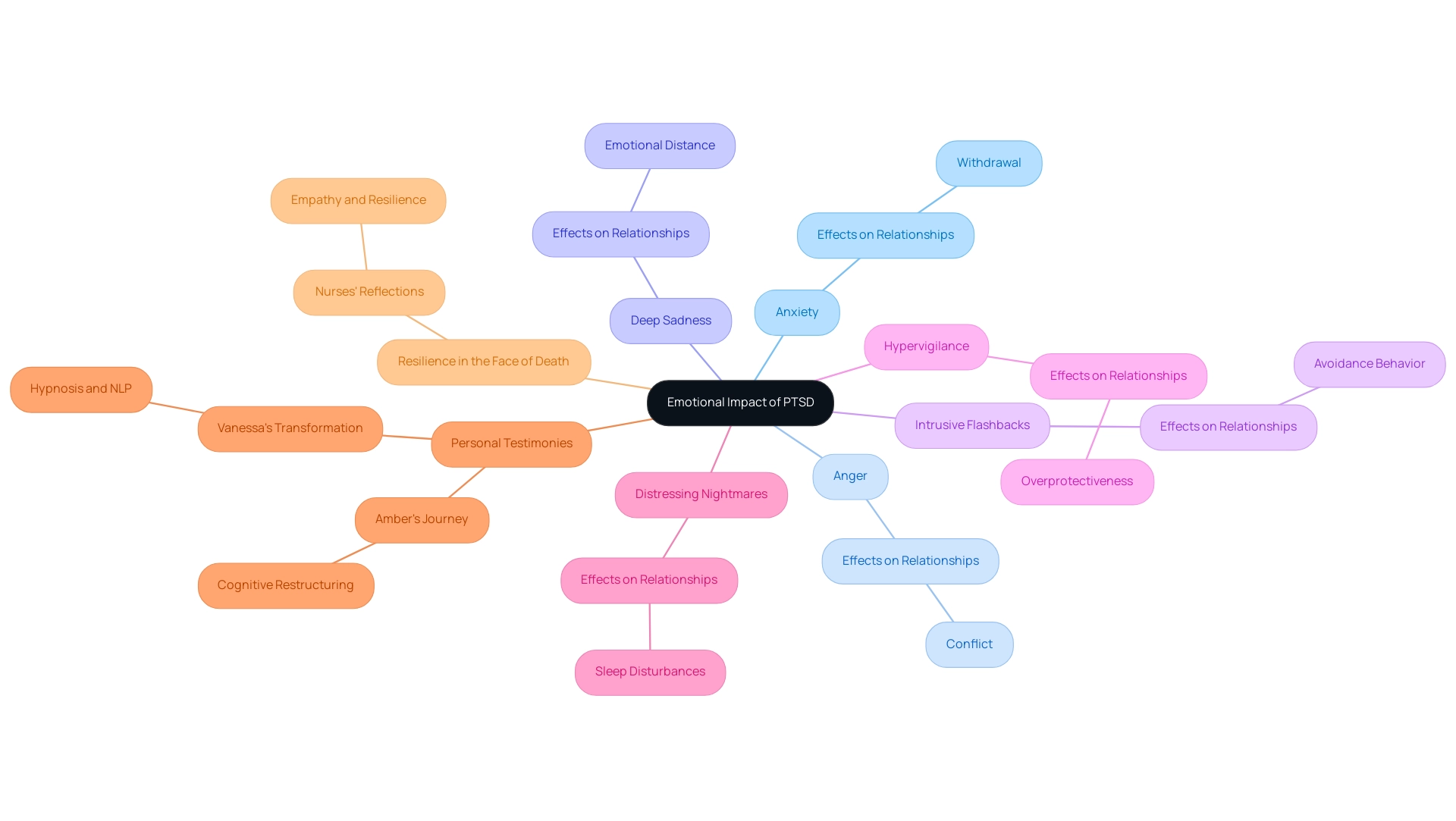
How PTSD Affects Relationships: Communication and Intimacy Challenges
Post-Traumatic Stress Disorder can create profound communication barriers in close relationships. Survivors often grapple with articulating their feelings, which can lead to defensive reactions in response to perceived threats. For instance, Amber's journey overcoming trauma and grief through various therapies, including cognitive behavioral therapy (CBT) and EMDR, illustrates the importance of effective communication in healing. Research highlights that elements such as humor, constructive problem-solving, and support provision are vital in communicating effectively with trauma survivors, as noted by Leifker et al. This nuanced understanding is crucial, as it underscores the need for partners to cultivate patience and openness.
Statistics indicate that approximately 60% of trauma survivors report significant communication challenges in their relationships, leading to increased levels of distress and misunderstanding. Intimacy, both psychological and physical, can also be profoundly influenced. Many survivors, like Vanessa who conquered trauma, anxiety, burnout, and depression with Todd's effective and enjoyable approach using hypnosis and NLP, experience discomfort with physical touch or emotional closeness, stemming from their past traumas. For example, a case summary titled 'Summary of Trauma and Distress in Connections' reveals that symptoms associated with trauma can significantly impair interpersonal functioning, often more so than trauma-specific symptoms themselves. This case study illustrates how general symptoms and behaviors account for greater variance in interpersonal impairments, highlighting the importance of understanding these dynamics.
To navigate these challenges, open dialogue is paramount. Partners should engage in honest conversations where both individuals feel secure in expressing their needs and vulnerabilities. Techniques such as active listening—where one person fully concentrates, understands, and responds to the other—along with validating each other’s feelings, can help bridge communication gaps. As one therapist states, "Understanding and acknowledging the trauma is a vital step in rebuilding intimacy and trust." These methods not only aid comprehension but also foster a profound connection, which is essential for healing and closeness in relationships impacted by trauma. Testimonials from clients who have worked with Todd and Gina further affirm the effectiveness of these targeted methods, showcasing real-life transformations and improvements in emotional well-being.
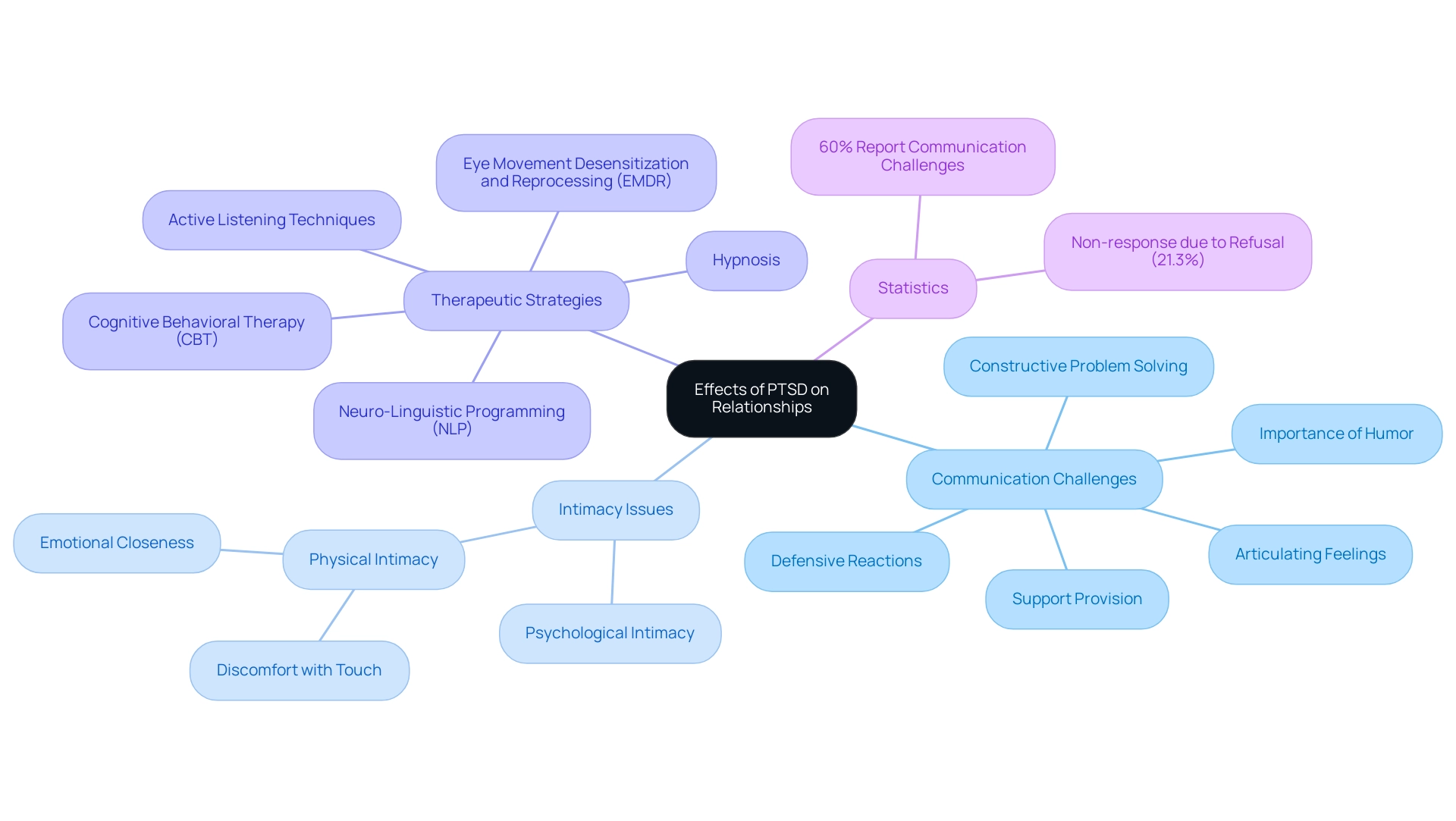
Supporting Your Partner: Strategies for Managing PTSD Together
Establishing a supportive environment for transparent dialogue is essential for individuals assisting one another through the difficulties of post-traumatic stress. With approximately 7-8% of the U.S. population experiencing PTSD at some point in their lives, the importance of strong support systems cannot be overstated. Regularly checking in about feelings and potential triggers fosters understanding and connection, significantly alleviating stress during difficult moments. Developing a plan together for managing these challenges can empower both partners. Participating in mindfulness activities as a pair, such as meditation or yoga, not only fosters presence and connection but also boosts resilience and intimacy.
Hypnosis and NLP, as highlighted by numerous testimonials from clients like Gabriela Stanard and Oscar N., demonstrate the transformative impact these therapies can have on managing trauma-related symptoms. Clients have reported significant improvements in anxiety and relationship satisfaction after just a few sessions, illustrating how such therapeutic approaches can facilitate healing. As Vincent J. Felitti, MD, observes in 'The Body Keeps the Score,' our life experiences profoundly influence our physical and mental well-being. This comprehension further strengthens the bond between individuals, enabling them to explore their psychological landscapes together. For instance, a case study involving a couple who practiced mindfulness together reported a significant reduction in anxiety and improved relationship satisfaction. This shared journey not only strengthens the bond but also encourages both individuals to support each other in overcoming emotional trauma, fostering a profound sense of solidarity.
Please reach out to learn more about our offerings and how we can assist you on your journey to healing.
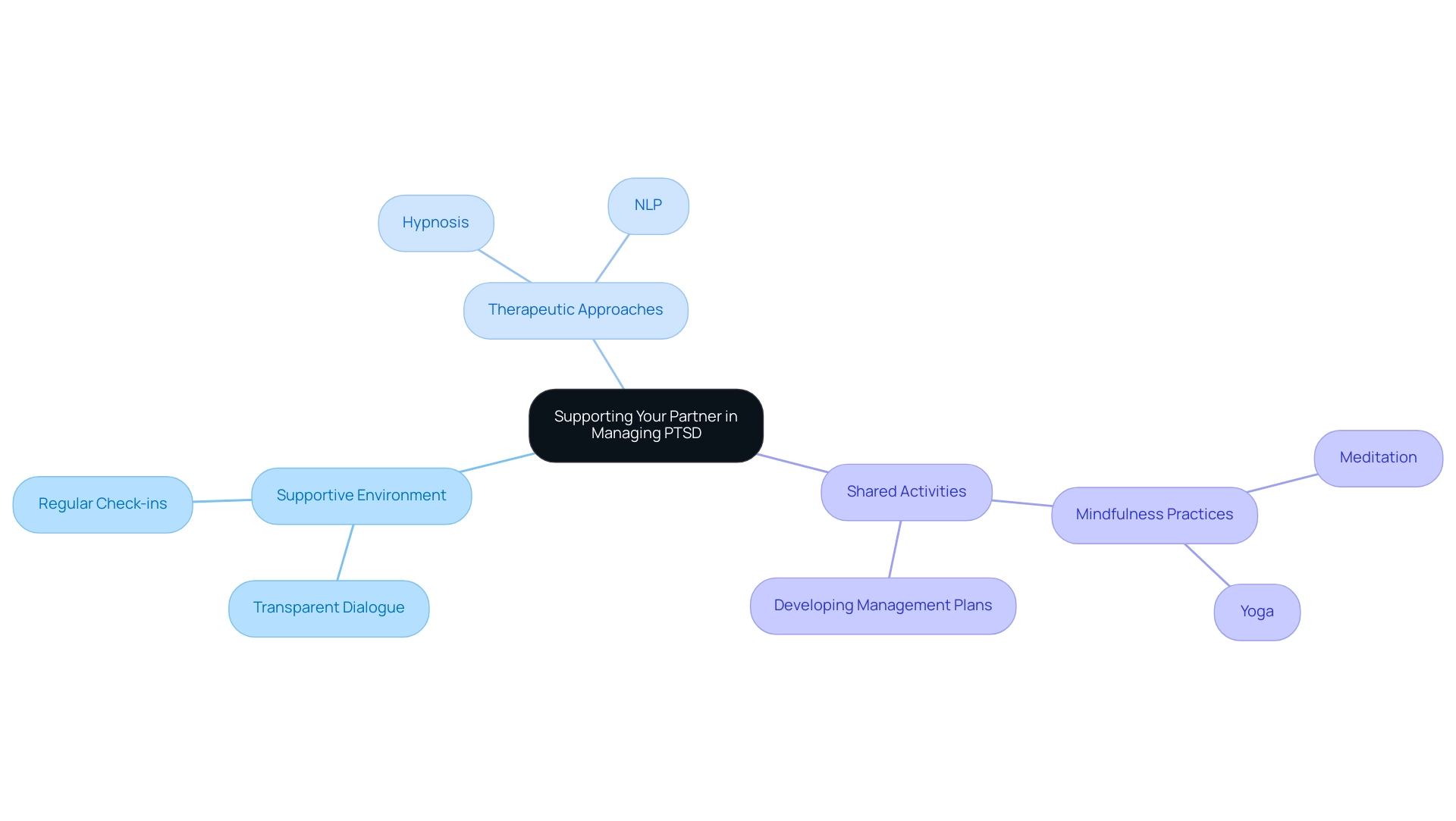
Coping Strategies and Self-Care for PTSD Survivors and Their Partners
Self-care is a crucial element of recovery for both trauma survivors and their partners. For those who have experienced trauma, engaging in emotionally nurturing activities such as journaling, exercise, or art therapy can facilitate profound healing. Notably, Amber's journey illustrates this, as she found transformative relief from trauma symptoms after struggling for two years with traditional therapies, including talk therapy and CBT, before discovering Gina's innovative techniques, which provided a fun and effective alternative. Similarly, Vanessa overcame years of trauma, anxiety, and burnout after trying talk therapy and EMDR, with Todd's trauma-clearing approach, which she said was actually "fun."
According to a study published in the Journal of Traumatic Stress, approximately 60% of survivors of post-traumatic stress disorder reported improved emotional regulation after participating in art therapy. These practices not only foster self-expression but also promote a greater sense of peace and understanding. Partners of survivors must also prioritize their own well-being to prevent burnout, which can significantly impact the relationship. Current findings suggest that burnout rates in partners of PTSD survivors can be as high as 40%, emphasizing the need for self-care. This can be accomplished by:
- Seeking support from friends
- Participating in satisfying hobbies
- Joining a yoga class, which has been shown to improve well-being
Establishing healthy boundaries around emotional labor is crucial, allowing both individuals to recharge. Frequently allocating time for self-reflection and engaging in personal interests not only aids in maintaining balance within the connection but also fosters individual growth.
As Elisabeth Kubler-Ross wisely stated, 'The most beautiful people we have known are those who have known defeat, suffering, struggle, and loss and have found their way out of the depths.' Embracing this journey together can cultivate resilience and deepen the connection between partners. Recent news emphasizes that couples who participate in shared healing activities report a 30% increase in relationship satisfaction, further underscoring the significance of mutual support in the healing process.
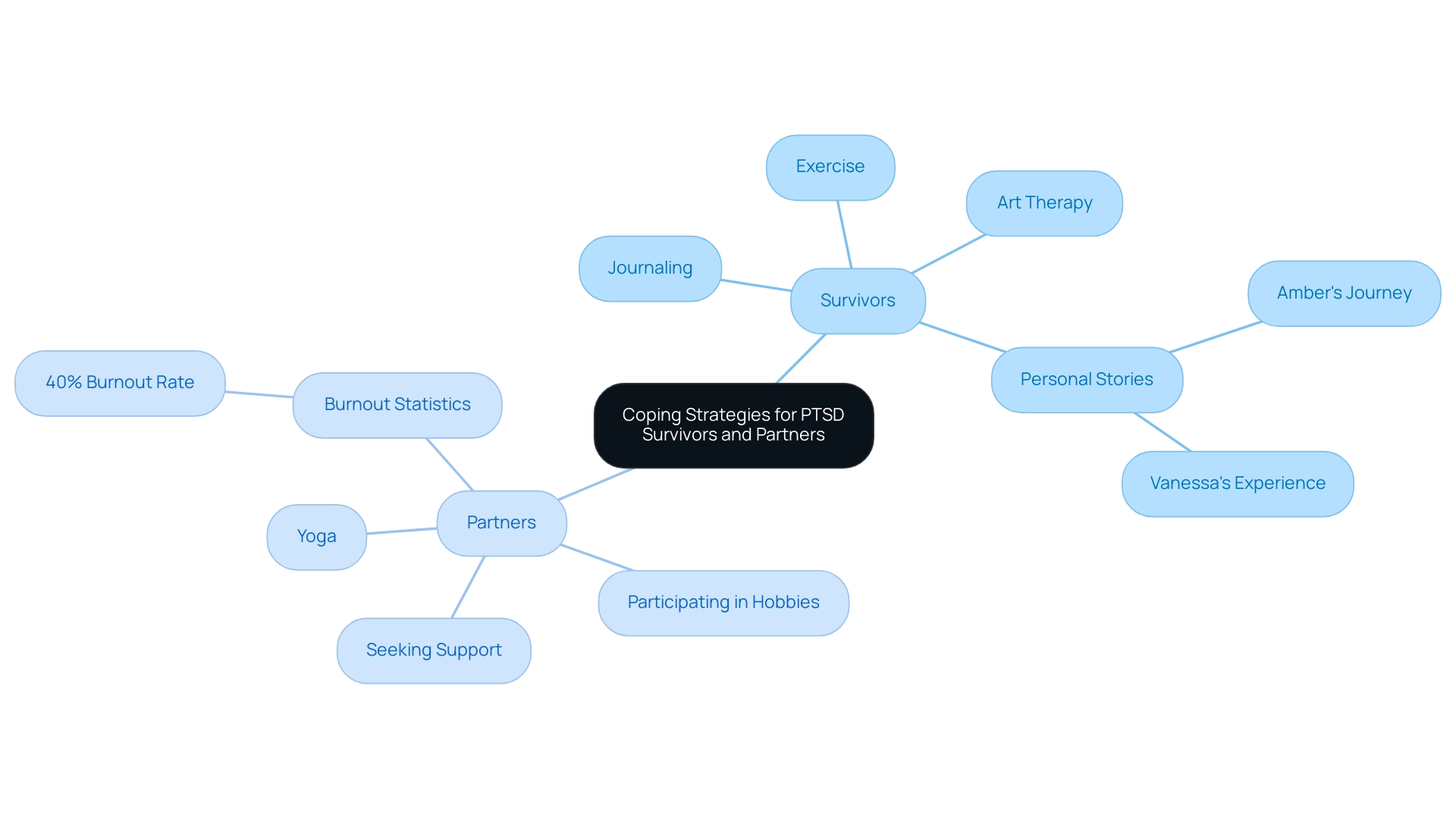
The Role of Professional Support in Managing PTSD in Relationships
For couples managing the challenges of post-traumatic stress, professional support can act as a transformative lifeline. Individual therapy through one-on-one sessions offers survivors a safe space to process their trauma, while couples therapy enhances communication and intimacy. With personalized services utilizing hypnosis, NLP, and memory reconsolidation, clients can target the root causes of their emotional pain.
Goodwin Hypnosis can help with various challenges, including:
- Addictions
- Anxiety
- Grief
- Trauma
Recent research indicates that approximately 70% of couples experiencing PTSD report enhanced satisfaction in their partnership after engaging in specialized therapy. Skilled hypnotists at Goodwin Hypnosis equip couples with essential tools to tackle challenges together, fostering a deeper understanding of each other’s experiences.
For example, Jonathan Harnisch expresses his belief in his worthiness of a good life despite struggles, which can inspire couples to recognize their own value. It is essential to seek a therapist who specializes in trauma and interpersonal dynamics, as they can provide tailored strategies that resonate with both partners.
Remember, as Sarah Crosby wisely notes, 'No amount of support or generosity justifies someone treating you badly. This includes parents.' Additionally, therapists often emphasize that seeking help is not just a call for assistance; it is a proactive step toward healing and personal growth, affirming your worthiness of a fulfilling relationship.
Contact us today to begin your journey towards recovery and empowerment by seeking professional help to overcome emotional and behavioral challenges, including unresolved trauma.
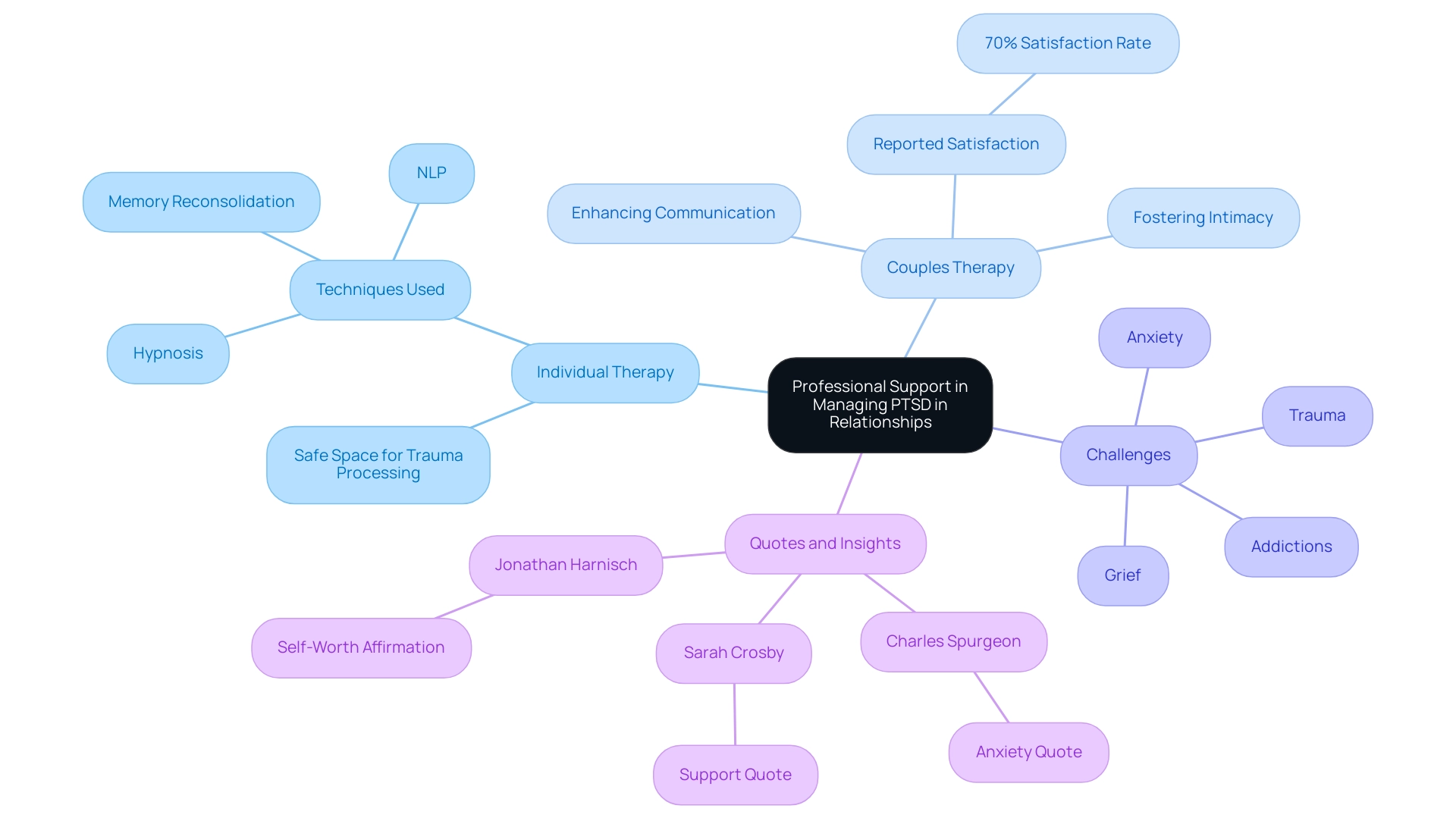
Conclusion
Navigating the emotional terrain of PTSD can be challenging for both individuals and their partners. Understanding the profound emotional responses associated with PTSD is essential for fostering compassion and connection in relationships. By recognizing the impact of anxiety, withdrawal, and emotional numbness, partners can cultivate patience and support, creating a nurturing environment that encourages healing.
The journeys of individuals like Amber and Vanessa illustrate the power of innovative subconscious-focused approaches, underscoring the importance of addressing emotional responses to facilitate understanding and growth.
Communication and intimacy often face significant hurdles due to PTSD, but open dialogue is key. Partners must engage in honest conversations, utilizing techniques such as active listening and validation to bridge communication gaps. This proactive approach not only enhances emotional connection but also rebuilds trust, allowing both individuals to navigate their emotional landscapes together.
The testimonials from clients who have embraced these strategies reveal that effective communication can lead to substantial improvements in relationship satisfaction and emotional well-being.
Supporting each other through PTSD requires a commitment to self-care and shared coping strategies. Engaging in mindfulness practices, pursuing individual interests, and prioritizing emotional well-being can empower both partners while preventing burnout. As the journey unfolds, the role of professional support becomes increasingly vital.
Specialized therapy can provide essential tools for managing trauma, enhancing communication, and fostering deeper intimacy. Ultimately, acknowledging the complexities of PTSD and embracing the journey together can lead to profound healing, resilience, and a strengthened bond. By prioritizing mutual support and understanding, couples can transform their relationships into safe havens where both individuals can thrive.




